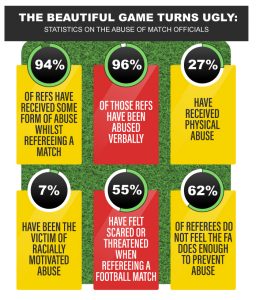8 months ago, more than 2,000 referees in England went on strike over the abuse received by match officials, leading to masses of grassroots matches cancelled.
It is about time we blew the whistle on abuse towards football referees. A survey conducted by Ticketgum.com has revealed that as many as 94% of football referees have admitted to being a victim of on-pitch abuse.
Ticketgum.com spoke to almost 300 referees, from various levels, about their treatment during a match. Alongside this, Ticketgum.com also spoke to grassroots referee Tom R, about his experiences on the pitch.
Research has revealed that as many as 94% of referees have experienced some form of abuse during their career. 96% of those referees have been abused verbally, 27% have been the victim of actual physical assaults, and 7% have experienced racially motivated abuse. Due to their on-pitch experience, 55% of referees have felt scared or threatened whilst refereeing a match.
Threatening and abusive behaviour from players, spectators and even parents, has certainly been the experience of 27-year-old, grass-roots referee Tom R.
He has told Ticketgum.com the following:
“A lot of players are fine off the pitch. But as soon as they cross that white line, they change completely. They don’t speak to you, they scream at you, aggressively, when they know they’re in the wrong. They do this not to make you change your mind about your decision, but to get inside your head for the next 50:50 decision you’ll make. They hope that it’ll sway it next time. There is no respect.
I’m a competent ref for the level I’m at. However, every SINGLE game, there is a form of abuse – usually the players and managers, but sometimes the crowds. I was an assistant on a game recently where the smallish crowd were unhappy a late decision from the referee. As we walked off the pitch, a large group greeted the referee, me, and the other assistant with the worst abuse I’ve had since I’ve been refereeing. It involved comments about the ref’s weight, his children, his wife.”
Tom is not alone in his experience. From Ticketgum’s survey, one referee commented that he was “assaulted several times by youths and adults. The worst time was when I was punched unconscious and then kicked in the head. I do not remember the game at all and my memory is not as good as before. I am also permanently damaged in my right eye.”
The consensus amongst referees is that there is a lack of respect in the game, which is made worse by a lack of action by the FA to prevent future abuse. Indeed, 62% of referees questioned did not feel that the FA does enough to help highlight the issue.
Ryan Hampson, ambassador for charity Ref Support UK, said the following:
“Some FAs are bringing in new policies but others aren’t budging and it’s really disappointing because the message I’m getting is that they don’t want to help their referees.”
Many match officials cited that the example should be set at the top of the game, on television, to help it filtrate down to grassroots level. However, even then, more support and aftercare is needed to help referees after they have been abused during a match.
“My local FA puts out a respect program but does little to actively monitor its progress”, one referee wrote, with another stating “when an incident is reported, there is an insincere phone call on Monday (after a Saturday game) as the office isn’t open until Monday. It can affect your Sunday game if you haven’t got anyone to chat to”.
However, it is not always the other players that referees need to be aware of, as spectators and even parents can exhibit the most abusive behaviour. One referee wrote that “parents are much worse than players. When a child hears their parent calling the referee names they think it’s ok for them to abuse the referee.”
Could sin bins be the answer?
Image credit: CosminIftode/Shutterstock
Recently, the FA have been piloting ‘sin bins’, a box or bench, where offending players can be sent for a period as a penalty for dissent during a game. However, this hasn’t been done before in England. Many match officials felt positively about the so-called ‘sin-bins’, grassroots referee Tom R stated:
“Usually, dissent is punishable with a yellow or in some cases, a red card. However, players and clubs aren’t too fussed with getting a yellow. It’s a small fine for the club and that’s it. So, abuse continues.
A sin bin on the other hand, puts that player off the pitch for 10 minutes. Now the teams DO care – they’re down to 10 men for a period of time, which will hinder their team. Now the players will hopefully think twice about screaming some abuse at you. That’s the idea, anyway. Personally, I’ve used it once so far, this season. It seems to work quite well. But will they implement it at the top level? I don’t know.”
Feature image credit: cristiano barni/Shutterstock




